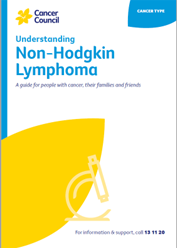- Home
- Non-Hodgkin lymphoma
- Diagnosis
- Staging and grading
Staging and grading for non-Hodgkin lymphoma
Tests help show how far non-Hodgkin lymphoma has spread. This process is called staging and it helps your health care team recommend the best treatment for you.
Learn more about:
Staging
Staging is a way of describing how far non-Hodgkin lymphoma has spread throughout the body. These tests help your doctors work out the stage of the cancer. The table below describes the different stages of non-Hodgkin lymphoma. Knowing the stage helps your doctor work out the best treatment for you.
As well as a number, each stage is given a letter (A or B) based on whether you have specific symptoms:
- The letter A means you have none of the B symptoms (see next)
- The letter B means you have B symptoms, which are fever, night sweats and/or unexplained weight loss.
Stages of non-Hodgkin lymphoma
| stage 1 | One lymph node group is affected. This is either above or below the diaphragm. |
| stage 2 | Two or more lymph node groups are affected either above or below the diaphragm. |
| stage 3 | Lymph node groups both above and below the diaphragm are affected. |
| stage 4 | Lymphoma is in multiple lymph nodes and has spread to other parts of the body (e.g. bone marrow, liver, lungs). |
Grading
Doctors also give non-Hodgkin lymphoma a grade, which is based on the look and shape of the cancer cells. The grade also describes how quickly the lymphoma is likely to grow and spread.
Non-Hodgkin lymphoma is separated into slow-growing (low-grade) and fast-growing (intermediate-grade and high-grade). They are treated in slightly different ways.
Follicular lymphoma is the most common type of low-grade lymphoma. Diffuse large B-cell lymphoma is the most common type of high-grade lymphoma. The table below describes the different grades.
Grades of non-Hodgkin lymphoma
| low-grade (slow-growing) | Doctors may call this indolent lymphoma. Cancer cells look and act much like normal cells and divide slowly. It may cause few symptoms in the beginning because there is little change in the cancer over time. It often doesn’t need to be treated straightaway. |
| intermediate-grade and high-grade (fast-growing) | Doctors may call this aggressive lymphoma. Cancer cells look and act less like normal cells. It grows much faster than low-grade non-Hodgkin lymphoma and needs to be treated as soon as possible to have the best chance of destroying he cancer and achieving remission. |
Prognosis
Prognosis means the expected outcome of a disease. You may wish to discuss your prognosis and treatment options with your haematologist (or medical oncologist if they are your main treating specialist).
However, it is not possible for anyone to predict the exact course of the disease. Instead, your doctor can give you an idea about common issues that affect people with your type of non-Hodgkin lymphoma.
Important factors in assessing your prognosis include:
- your test results
- the type of non-Hodgkin lymphoma you have
- the stage
- the rate of tumour growth
- the likelihood of response to treatment
- other factors such as your age, level of fitness and medical history.
You will also have tests throughout your treatment that show how well the treatment is working.
Remission
Most people who are treated for non-Hodgkin lymphoma go into remission after treatment. Remission means the symptoms of cancer have decreased or disappeared and there is no evidence of disease on physical examination or imaging tests. During remission, you will need regular check-ups to ensure that you are still healthy and the cancer hasn’t returned.
People may experience multiple episodes (relapses) of the disease during their lifetime, meaning they go in and out of remission. Learn more about treatment for relapsed lymphoma.
→ READ MORE: Your health care team
Podcast: Tests and Cancer
Listen to more of our podcast for people affected by cancer
More resources
Dr Puja Bhattacharyya, Haematology Staff Specialist, Western Sydney Local Health District, Blacktown Hospital; A/Prof Christina Brown, Haematologist, Royal Prince Alfred Hospital and The University of Sydney; Dr Susan Carroll, Senior Staff Specialist, Radiation Oncology, Royal North Shore Hospital and The University of Sydney; Jo Cryer, Clinical Nurse Consultant, Haematology, St George Hospital; Marie Marr, Consumer; Katelin Mayer, Clinical Nurse Consultant, Cancer Outreach Team, Nelune Comprehensive Cancer Centre, Sydney; Vanessa Saunders, 13 11 20 Consultant, Cancer Council NSW; Elise Toyer, Haematology Clinical Nurse Consultant, Blacktown Hospital.
View the Cancer Council NSW editorial policy.
View all publications or call 13 11 20 for free printed copies.

